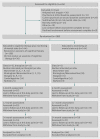Early detection and intervention evaluation for people at risk of psychosis: multisite randomised controlled trial
- PMID: 22491790
- PMCID: PMC3320714
- DOI: 10.1136/bmj.e2233
Early detection and intervention evaluation for people at risk of psychosis: multisite randomised controlled trial
Abstract
Objective: To determine whether cognitive therapy is effective in preventing the worsening of emerging psychotic symptoms experienced by help seeking young people deemed to be at risk for serious conditions such as schizophrenia.
Design: Multisite single blind randomised controlled trial.
Setting: Diverse services at five UK sites.
Participants: 288 participants aged 14-35 years (mean 20.74, SD 4.34 years) at high risk of psychosis: 144 were assigned to cognitive therapy plus monitoring of mental state and 144 to monitoring of mental state only. Participants were followed-up for a minimum of 12 months and a maximum of 24 months.
Intervention: Cognitive therapy (up to 26 (mean 9.1) sessions over six months) plus monitoring of mental state compared with monitoring of mental state only.
Main outcome measures: Primary outcome was scores on the comprehensive assessment of at risk mental states (CAARMS), which provides a dichotomous transition to psychosis score and ordinal scores for severity of psychotic symptoms and distress. Secondary outcomes included emotional dysfunction and quality of life.
Results: Transition to psychosis based on intention to treat was analysed using discrete time survival models. Overall, the prevalence of transition was lower than expected (23/288; 8%), with no significant difference between the two groups (proportional odds ratio 0.73, 95% confidence interval 0.32 to 1.68). Changes in severity of symptoms and distress, as well as secondary outcomes, were analysed using random effects regression (analysis of covariance) adjusted for site and baseline symptoms. Distress from psychotic symptoms did not differ (estimated difference at 12 months -3.00, 95% confidence interval -6.95 to 0.94) but their severity was significantly reduced in the group assigned to cognitive therapy (estimated between group effect size at 12 months -3.67, -6.71 to -0.64, P=0.018).
Conclusions: Cognitive therapy plus monitoring did not significantly reduce transition to psychosis or symptom related distress but reduced the severity of psychotic symptoms in young people at high risk. Most participants in both groups improved over time. The results have important implications for the at risk mental state concept.
Trial registration: Current Controlled Trials ISRCTN56283883.
Conflict of interest statement
Competing interests: All authors have completed the ICMJE uniform disclosure form at
Comment in
-
Rational policy making for early psychosis might yet become possible.BMJ. 2012 May 8;344:e3137. doi: 10.1136/bmj.e3137. BMJ. 2012. PMID: 22570203 No abstract available.
-
Cognitive therapy may reduce psychotic symptom severity but not risk of transition to psychosis in young people at high risk.Evid Based Ment Health. 2013 Aug;16(3):83. doi: 10.1136/eb-2012-100808. Epub 2013 May 21. Evid Based Ment Health. 2013. PMID: 23696097 No abstract available.
References
-
- Yung AR, McGorry PD, McFarlane C, Jackson HJ, Patton GC, Rakkar A. Monitoring and care of young people at incipient risk of psychosis. Schizoph Bull 1996;22:283-303. - PubMed
-
- McGorry PD, Yung AR, Phillips LJ, Yuen HP, Francey S, Cosgrave EM, et al. Randomized controlled trial of interventions designed to reduce the risk of progression to first-episode psychosis in a clinical sample with subthreshold symptoms. Arch Gen Psychiatry 2002;59:921-8. - PubMed
-
- Yung AR, Phillips LJ, Nelson B, Francey SM, PanYuen H, Simmons MB, et al. Randomized controlled trial of interventions for young people at ultra high risk for psychosis: 6-month analysis. J Clin Psychiatry 2011;72:430-40. - PubMed
-
- McGlashan TH, Zipursky RB, Perkins D, Addington J, Miller T, Woods SW, et al. Randomized, double-blind trial of olanzapine versus placebo in patients prodromally symptomatic for psychosis. Am J Psychiatry 2006;163:790-9. - PubMed
-
- Addington J, Epstein I, Liu L, French P, Boydell KM, Zipursky RB. A randomized controlled trial of cognitive behavioral therapy for individuals at clinical high risk of psychosis. Schizoph Res 2011;125:54-61. - PubMed
Publication types
MeSH terms
Associated data
Grants and funding
LinkOut - more resources
Full Text Sources
Medical

